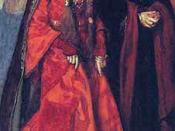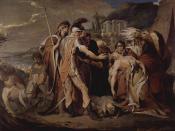The search for self is endless, lifelong. While wrought with distress and obstacles, consequences of a physical journey are self-discovery and inner nourishment. While destination is the short-term goal, it is the physical journey that leads there that causes the growth, transformation and greater understanding of the character. This can be best discussed through critical analyses of award-winner Michael Gow's play Away, Richard Kelley's indie-cum-cult film Donnie Darko, Vanessa Carlton's individually expressive song White Houses and Margaret Atwood's poignant confessional poem Journey to the Interior.
Set in the post-war baby boom in the Australian summer of 1967/68, while Australians were preoccupied with Vietnam and unsure as to their international coming-of-age, Away revolves around three families, linked by their dysfunction, as they embark on what will be the leading emotional, introspective summer vacations of their lives. The epigraph from 'Twelfth Night" is a fitting metaphor for the period. The line "What country, friends, is this?" is symptomatic of a nation questioning its ideals and identity.
Tom is the play's protagonist and catalyst. Michael Gow has stated that through most of the play he is "in control". He engineers the play's upheaval in the play's prominent curse scene, and then saves those who have been affected by it. In doing this he restores the other characters' footing which results in their renewed homecoming.
Toms' turning point occurs following his failure of seducing Meg, aware of his emerging sexuality, Tom yearns for a sexual experience "Just once". When he doesn't get what he wants he descends in a free-fall, resembling that of the other characters. Consequently he is flawed, despite the audiences' dependence on him. His pleading gives his character depth and humanity.
All the characters find themselves in circumstances that force them to change and Michael Gow uses a variety of...



Good
A good speech with some useful points.
2 out of 2 people found this comment useful.